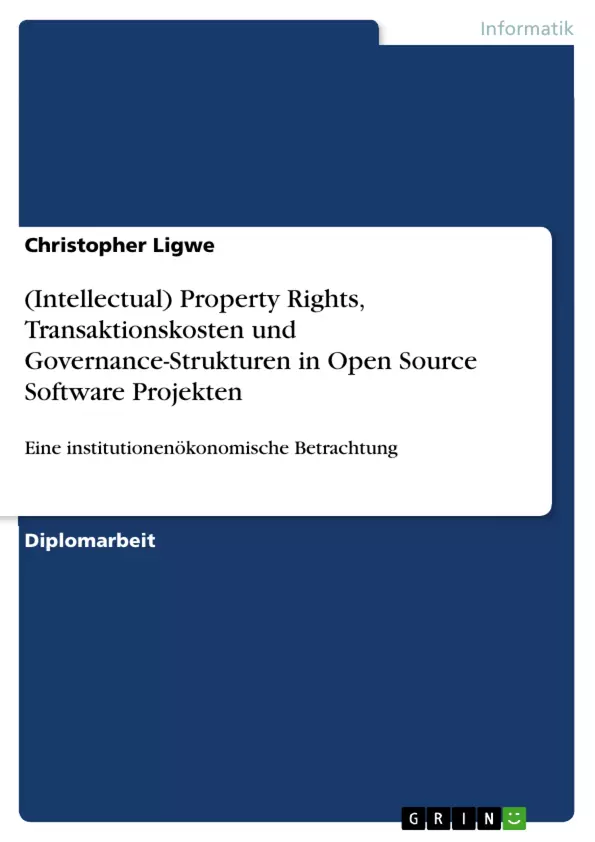Die zunehmende Etablierung von Open Source Software (OSS)1 im Softwaremarkt hat dazu geführt, dass nicht nur das private und öffentliche, sondern auch das wissenschaftliche Interesse an OSS-Projekten zugenommen hat. Neben dem Betriebssystem Linux stellen zunehmend auch viele weitere OSS-Anwendungen, wie z.B. der Webbrowser Mozilla/Firefox oder der Apache Webserver ernstzunehmende Konkurrenz für ihre Mitstreiter aus dem Bereich der Closed Source Software (CSS) dar. Diese Entwicklung zeigt, dass sich mit OSS-Projekten eine alternative Organisationsform zur Erstellung komplexer Software herausgebildet hat. Der Erfolg von OSS-Projekten hängt dabei stark davon ab, inwieweit die Communities in der Lage sind, ihre Zusammenarbeit effizient zu koordinieren.
Inhaltsverzeichnis
- 1. Einleitung
- 1.1. Motivation und Zielsetzung
- 1.2. Aufbau der Arbeit
- 2. Das Gut Software
- 2.1. Ökonomische Eigenschaften von Software
- 2.1.1. Software als Netzwerkgut
- 2.1.2. Software als Informationsgut
- 2.1.3. Software als komplexes Gut
- 2.1.4. Software als digitales Gut
- 2.1.5. Software als Gut ohne Rivalität im Konsum
- 2.2. Open Source Software
- 2.2.1. Motive der beteiligten Entwickler
- 2.2.2. OSS- vs. CSS- Lizenzen
- 2.2.2.1. Offene OSS-Lizenzen
- 2.2.2.2. Virale OSS-Lizenzen
- 2.2.2.3. CSS-Lizenzen
- 2.2.2.4. Resümee zu den Lizenzmodellen
- 2.3. (Intellectual) Property Rights und Softwareproduktion
- 3. Governance von Open Source Software Projekten
- 3.1. OSS-Governance und Projektlebenszyklus
- 3.1.1. Die Einführungsphase
- 3.1.2. Die Wachstumsphase
- 3.1.3. Die Reifephase
- 3.1.4. Die Rückgangsphase (mit oder ohne Wiederaufleben)
- 3.1.5. Erkenntnisse aus der Lebenszyklusbetrachtung
- 3.1.6. Einführung von Governance-Instrumenten - eine Gradwanderung
- 3.2. OSS-Governance und Institutionenökonomik
- 3.2.1. OSS-Governance und Transaktionskosten
- 3.2.2. Institutionelle Arrangements zur OSS-Governance
- 3.2.2.1. Prinzip der Offenheit
- 3.2.2.2. Interne Governance
- 3.2.2.2.1. Modularität in Programmarchitektur und Projektorganisation
- 3.2.2.2.2. Hierarchie nach Leistung
- 3.2.2.2.3. Passive Kontrollrechte
- 3.2.2.2.4. Standardisierte Kommunikationsmechanismen
- 3.2.2.2.5. Standardisierte Koordinationsmechanismen
- 3.2.2.2.6. Instrumente zur Sicherung intrinsischer und Förderung extrinsischer Motive
- 3.2.2.3. Externe Governance
- 3.2.3. Zusammenfassung zur Governance von OSS-Projekten
- 4. Institutionenökonomische Erkenntnisse
- 5. Fazit und Ausblick
- Das Konzept von Open Source Software und seine ökonomischen Eigenschaften
- Die Rolle von (Intellectual) Property Rights bei der Softwareproduktion
- Governance-Strukturen in OSS-Projekten und ihre Bedeutung für die Koordinierung und Motivation von Entwicklern
- Der Zusammenhang zwischen Transaktionskosten und Governance-Strukturen in OSS-Projekten
- Institutionenökonomische Erkenntnisse und ihre Anwendung auf OSS-Projekte
Zielsetzung und Themenschwerpunkte
Diese Arbeit untersucht die Rolle von (Intellectual) Property Rights, Transaktionskosten und Governance-Strukturen in Open Source Software (OSS) Projekten. Ziel ist es, die institutionenökonomischen Zusammenhänge und die Bedeutung dieser Faktoren für den Erfolg und die Entwicklung von OSS-Projekten zu analysieren.
Zusammenfassung der Kapitel
Das erste Kapitel führt in das Thema ein und erläutert die Motivation und Zielsetzung der Arbeit. Im zweiten Kapitel werden die ökonomischen Eigenschaften von Software beleuchtet, insbesondere im Hinblick auf ihre Rolle als Netzwerkgut, Informationsgut, komplexes Gut, digitales Gut und Gut ohne Rivalität im Konsum. Außerdem wird das Konzept der Open Source Software näher betrachtet, einschließlich der Motive der beteiligten Entwickler und der verschiedenen Lizenzmodelle. Das dritte Kapitel analysiert die Governance von OSS-Projekten im Kontext des Projektlebenszyklus. Es wird die Entwicklung von OSS-Projekten von der Einführungsphase bis zur Reifephase und möglichen Rückgangsphase betrachtet. Des Weiteren werden die institutionenökonomischen Aspekte der OSS-Governance beleuchtet, insbesondere die Rolle von Transaktionskosten und die Bedeutung von institutionellen Arrangements wie Offenheit, interne und externe Governance. Das vierte Kapitel fasst die wichtigsten institutionenökonomischen Erkenntnisse der Arbeit zusammen und zeigt die Relevanz dieser Erkenntnisse für das Verständnis von OSS-Projekten. Abschließend bietet das fünfte Kapitel ein Fazit und Ausblick auf zukünftige Forschungsfragen.
Schlüsselwörter
Open Source Software, (Intellectual) Property Rights, Transaktionskosten, Governance-Strukturen, Institutionenökonomik, Projektlebenszyklus, Lizenzmodelle, Motivation der Entwickler, Koordinationsmechanismen.
- Quote paper
- Christopher Ligwe (Author), 2008, (Intellectual) Property Rights, Transaktionskosten und Governance-Strukturen in Open Source Software Projekten, Munich, GRIN Verlag, https://www.hausarbeiten.de/document/116067


